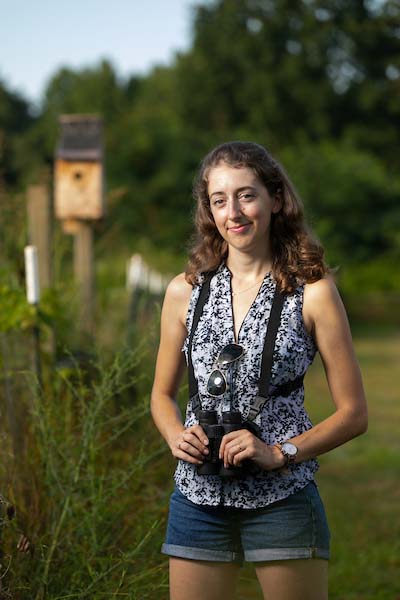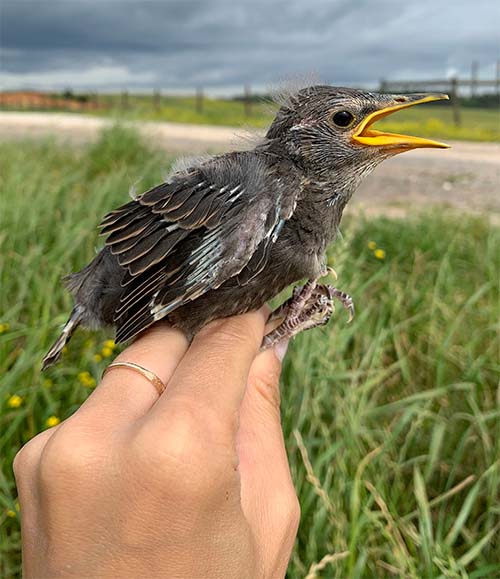

KENNESAW, Ga. | Aug 5, 2020

All it took for Kennesaw State University assistant professor of biology Sarah Guindre-Parker was holding a bird.
She arrived at Simon Fraser University in British Columbia as a biology major with a premed concentration, but all that changed once she joined a research project as an undergraduate.
“I’d never seen a bird close-up, they look like these weird little dinosaurs.,” said Guindre-Parker, who is about to start her second year with KSU in the College of Science and Math. “I got really hooked on the birds and the field work, which sent me down the path of pursuing graduate school, doing some of the same work that I do today.”
Her research work focuses on how European starlings cope with changing environments on both surface and cellular levels through their breeding, their behavior or their physiology.
“That’s really what I’m interested in—how animals navigate the world, especially under changing conditions,” she said. “Every organism faces some kind of change in their environment over their lifetime, so it’s not a unique problem exclusive to some animals in certain environments. It happens everywhere.”
As a professor, she tries to help her students find their paths. A product of undergraduate research herself, Guindre-Parker recognizes the importance of exploration and diversity of experiences during college. She said she has a place in her program for anyone who shows an interest in research no matter their major.
“I very much wanted a lab and a study system that allows undergrads to be involved in research because I am a product of that opportunity. It was very transformative for me,” she said. “Sometimes if enthusiastic students come to me and say, ‘I just want to see if I like research,’ I try to find a spot for them. I try not to rule them out if they’re not 100 percent serious about being a field biologist forever. You can’t know that before you’ve tried it.”
In addition to KSU’s emphasis on undergraduate research, Guindre-Parking said that the KSU Field Station also drew her to the University. Shortly after arriving in Georgia, she put up several bird nest boxes in hopes that starlings would lay eggs there this spring, during their prime nesting season.
“It’s a cool outdoor space that’s close to campus and a great opportunity for me and for students to get involved with field research as well,” she said. “I visited the Field Station and immediately thought birds will like this spot. We put out nest boxes and then right before the breeding season was about to start, starlings showed up and started using the boxes.”

Because starlings are creatures of habit, Guindre-Parker said she expects the same birds to come back to nest next spring. That’s a good baseline for a multiyear research project she has in mind, involving the influence of stress hormones on coping with environmental change, in the starlings that do return to the KSU Field Station.
“Right now, I’m just getting started with this specific system, but I envision having a long-term study lasting at least a decade where I’ve monitored the same individuals from multiple populations around Georgia over their whole lives” she said. “The goal would be to understand how starlings that live in an urban environment versus in a more rural environment have evolved their current coping strategy. Can you see differences in flexibility of behavior or physiology that persist across generations?”
With a field study system set up and a team of undergraduate researchers at the ready, Guindre-Parker said she will welcome two masters students to her group this fall as part of the Master of Science in Integrative Biology program, and in the future seek out more expansive field research opportunities for her team. For now, she marvels at how far she has come since her premed days, and how quickly her work has found a home at KSU.
“Looking back on it, I’m very proud of how much I’ve gotten done and how incredible the students that have joined my team in my first year have been,” she said. “I didn’t know anything about the people who I took on to work as part of the lab, but they’ve been great and motivated so far. I’m really excited to keep it going.”
– Dave Shelles
Photos by Jason Getz
A leader in innovative teaching and learning, Kennesaw State University offers undergraduate, graduate, and doctoral degrees to its more than 51,000 students. Kennesaw State is a member of the University System of Georgia with 11 academic colleges. The university's vibrant campus culture, diverse population, strong global ties, and entrepreneurial spirit draw students from throughout the country and the world. Kennesaw State is a Carnegie-designated doctoral research institution (R2), placing it among an elite group of only 8 percent of U.S. colleges and universities with an R1 or R2 status. For more information, visit kennesaw.edu.